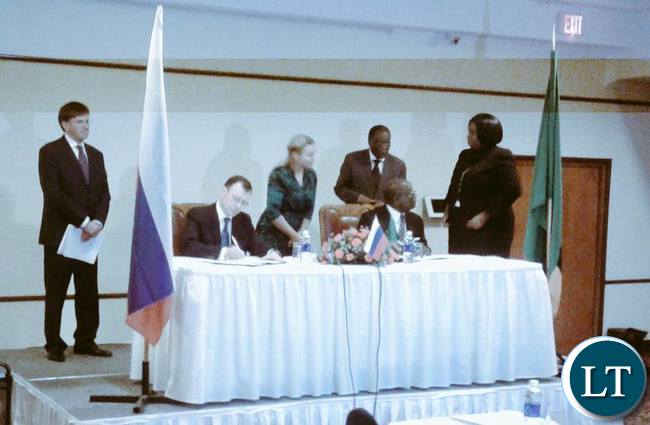
Government has established an Interim Secretariat on Nuclear Science and Technology (ISNST) constituted by senior officers from various Government Ministries and Institutions. The Units under the ISNST include Nuclear Applications, Public Awareness and Consultation, Economics Assessment, Legal and Regulatory, and Programme Development.
The ISNST will spearhead implementation of Zambian’s nuclear energy programme as well as the development of the Centre for Nuclear Science and Technology (CNST). The officers have since commenced work, which among others, will involve public awareness and consultations. Government also envisages the development of a Nuclear Power Plant as an alternative to Hydro Power which has proved unreliable.
Mr. Reuben Katebe from the National Institute for Scientific and Industrial Research (NISIR) is the National Coordinator and others on the Secretariat are Mr. Isaac Chipampe (Ministry of Information and Broadcasting Services), Mr. Abraham Miti (Ministry of Justice), Mr. Bright Mweetwa (NISIR), Dr. Dani Banda (UNZA), Mr. William Masocha (Ministry of Energy), Mr. Paul Mbewe (Ministry of Higher Education), Dr. Charles Chivweta (Ministry of Finance) and Dr. Nason Lambwe (University Teaching Hospital).
The ISNST will coordinate drafting of the Nuclear Science and Technology Policy and attendant Legislation; assess the position of the nuclear applications in Zambia’s development agenda; conduct an economic assessment of nuclear applications; develop legal, regulatory and legislative aspects of nuclear applications; conduct environmental and siting aspects of nuclear installations; and assess nuclear technologies suitable for Zambia, among others.
Government is hopeful that the nuclear energy programme will transform the country into an industrial hub in the region. A group of students have already been sent to Russia to study in various areas of nuclear science, who upon completing their studies would work in the CNST.
Government has since signed various agreements with the Russian Federation that have culminated into the implementation of the nuclear energy programme.
To hit the ground running, members of the ISNST on Thursday last week paid a courtesy call on the Minister of Information and Broadcasting Services, Hon. Kampamba Mulenga and explained that there are many myths about nuclear energy but the reality is that if the country wants to industrialise, then nuclear energy is the way to go.
The National Coordinator informed the Minister that after His Excellency the President Mr. Edgar Chagwa Lungu announced that Zambia would explore nuclear energy, an interim Secretariat on nuclear science and technology was established to articulate nuclear policies and regulations, conduct feasibility studies, hold public consultations, evaluate existing technologies, and assess the potential financing mechanisms towards the implementation of the nuclear science and technology programme.
Hon. Mulenga was impressed that nuclear science and technology was not just about power but was also used in food preservation and other industrial applications.
“As people tasked to inform the public about nuclear science, it is important to understand what this technology is about,” she said.
She hoped students sent to Russia to specialise in nuclear science would come and run the CNST rather than the country relying on expatriates.
The ISNST has embarked on a robust public sensitisation programme beginning with Members of the Cabinet and Members of Parliament.

I did not see anyone from the Environmental Regulatory Agencies on their Secretarite
Are we that dull and stupid??? There is no way Zambia can start dealing with Nuclear energy at this stage – we don’t have the capacity(infrastructure) and technology is expensive. In Zambia, we have a lot of Hydro-power capacity and it is a cleaner source of energy. Why can’t we concentrate on this and use this to supply excess to the SADC region? This is just a scheme to steal from govt coffers!!
Every African Nation should be Nuclear energy capable. Why not?
You can’t handle/deal with regular household waste ,can’t keep cholera at bay ,can’t keep open sewers free of toxic waste dumping and now you wanna go to risky nuclear stuff?
Even the caliber of the so called interim what ever u call them is so shallow the combination is just political in nature
I think we should have started with biowaste technology.
A case of putting the cart before the horse.
The working government. Am Humpty Dumpty tribal empty party is Hajelousy Hagain!
Ha-negatives!
We kept complaining about load-shading and now that a solution is found people are saying “We don’t have the capacity to handle nuclear energy and nuclear waste”. Its like we don’t know what we really want. Mind you they have signed a contract with the Russia who know how to handle nuclear energy and nuclear waste. They wouldn’t have signed if they knew they couldn’t dispose of the waste.